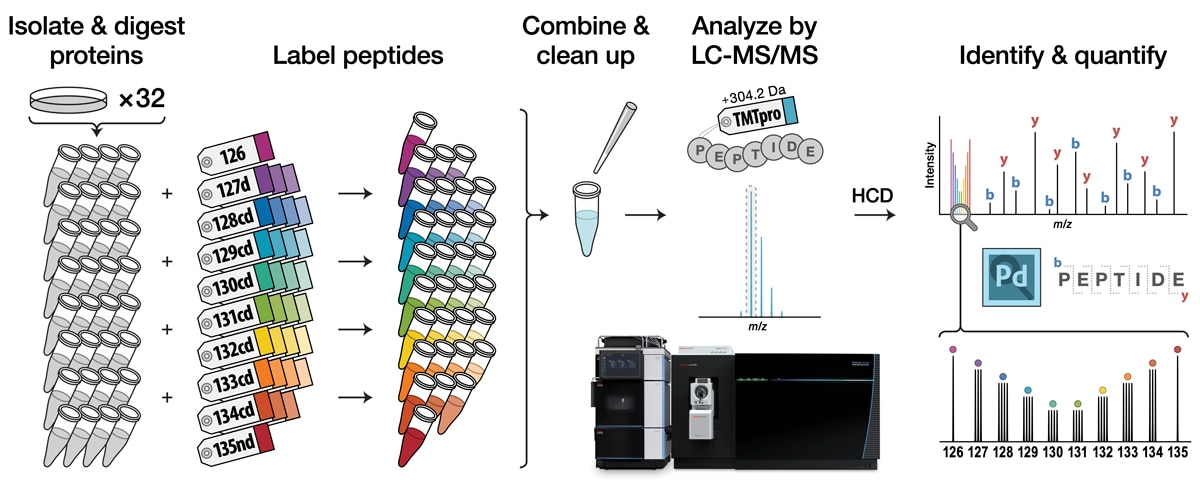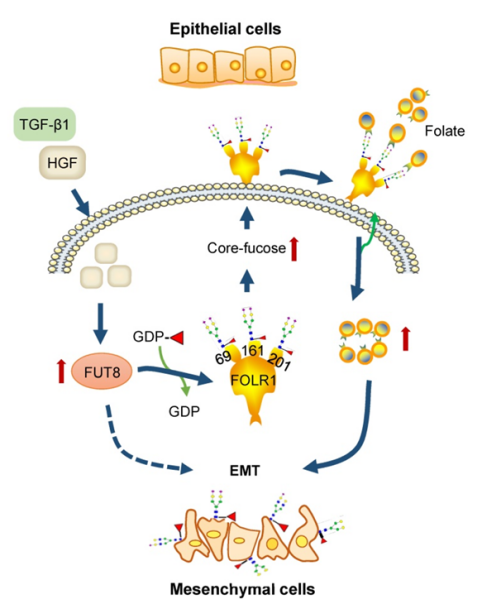Tandem Mass Tag Mass Spectrometry Analysis Service
Tandem mass tag mass spectrometry analysis focuses on studying the differences in protein expression levels between different samples and is an advanced branch of quantitative proteomics. Researchers use tandem mass tag mass spectrometry analysis service to compare different samples, such as protein expression level changes in different cell types, treatment conditions, or disease states. Especially in disease research, tandem mass tag mass spectrometry analysis helps to discover and validate potential biomarkers, assisting in disease diagnosis, prognosis, and treatment. In recent years, post-translational modifications such as phosphorylation, glycosylation, and lactylation have become research hotspots. Tandem mass tag technology continues to provide accurate quantitative analysis in these modified proteomes, offering a key tool to understand the roles of modified molecules in cellular signal transduction and disease progression. Furthermore, in the field of drug target discovery (TPD), tandem mass tag mass spectrometry analysis service can also assist researchers in determining whether target protein expression is inhibited and whether off-target effects exist.

www.thermofisher.cn
Figure 1. Workflow of tandem mass tag quantitative proteomics.
Services at MtoZ Biolabs
Based on tandem mass tag labeling combined with high-resolution LC-MS/MS, along with advanced bioinformatics analysis, MtoZ Biolabs offers tandem mass tag mass spectrometry analysis service that provides comprehensive insights into the expression differences of proteins in various samples. Our services cover the following core technical directions:
1. Tandem Mass Tag Mass Spectrometry Analysis Service
Using the latest TMTpro labeling reagents, tandem mass tag mass spectrometry analysis service uses TMT tags to label the proteins in samples and mixes them for analysis. This service allows for multiplex and relative protein quantification from up to 35 samples, including those from cells, tissues, or biological fluids. The isobaric nature of TMT labeling reagents enables the identification and quantification of proteins in different samples simultaneously using tandem mass spectrometry (MS).
MtoZ Biolabs uses Thermo Fisher's TMT labeling reagents, Orbitrap series mass spectrometers, and Nano-LC systems to ensure high precision and sensitivity in data acquisition. The combination of these technologies enables us to accurately quantify protein expression differences across different samples, providing in-depth insights into protein expression levels and downstream functional mechanisms in various physiological and pathological states.
Service Advantages
1. Advanced Analytical Platform
MtoZ Biolabs has established an advanced tandem mass tag mass spectrometry analysis service platform, ensuring reliable, fast, and high-precision analytical services.
2. Transparent Pricing
Our pricing is transparent, with no hidden or additional fees.
3. High Data Quality
Deep data coverage and strict data quality control. The bioinformatics platform integrates data from all tandem mass tag mass spectrometry analysis service and provides customers with comprehensive data quality control, differential analysis and functional analysis data reports.
4. Customized Research Solutions
MtoZ Biolabs will customize services based on your samples, addressing your unique research questions and experimental requirements.
Sample Submission Suggestions
1. Sample Types
We accept cell and tissue samples. Solid samples can be transported using ice packs. For liquid samples, vacuum drying or freeze-drying is recommended before transport with ice packs, or samples can be shipped with dry ice. We ensure samples are properly preserved to maintain protein integrity and ensure precise quantitative results.
2. Sample Amount
We recommend preparing at least three biological replicates.
*Note: If you have any special requirements or need assistance with sample preparation, please contact us.
Applications
1. Cancer Research
Identifying new biomarkers and therapeutic targets based on protein expression differences between cancerous and adjacent tissues.
2. Regenerative Medicine
Analyzing changes in protein expression levels during regeneration to help identify key proteins in the regenerative process.
3. Drug Development
Setting up treated and control groups to study the effects of drugs on target proteins and to determine whether off-target effects are present.
4. Developmental Biology
Investigating changes in protein expression levels during individual developmental growth to hypothesize the roles proteins play in development.
5. Modified Proteomics
Tandem mass tag technology is especially useful in the quantitative analysis of post-translational modifications, particularly in glycosylated proteomics, by labeling modified peptides.
Case Study
1. Using Tandem Mass Tag-Based Mass Spectrometry to Study the Molecular Mechanisms of Glycoproteomics in Hepatocellular Carcinoma EMT
Epithelial-mesenchymal transition (EMT) is considered a key step in the progression of many cancers, including hepatocellular carcinoma (HCC), to high invasiveness and metastasis. However, the mechanisms driving EMT remain unclear.The study systematically investigated the dynamic changes of specific glycosylation during HGF/TGF-β1-induced EMT in three HCC cell lines, based on the glycoproteomics approach of tandem mass tag mass spectrometry analysis service and further confirmed the possible role of EMT-related glycoproteins and specific sugar chains through a variety of molecular biology methods. The study found that treatment of HCC cells with HGF or TGF-β1 upregulated the glycosyltransferase FUT8, increasing core fucosylation, especially on the folate receptor α (FOLR1), enhancing folate uptake, and promoting EMT. FUT8 inhibition blocked this process, indicating that FUT8 is a key driver of EMT in HCC cells.

Li, Jia. et al. Theranostics, 2021.
Figure 2. Glycobiological mechanisms in the EMT process of hepatocellular carcinoma.
Deliverables
1. Comprehensive Experimental Details
2. Materials, Instruments, and Methods
3. Total Ion Chromatogram & Quality Control Assessment (project-dependent)
4. Data Analysis, Preprocessing, and Estimation (project-dependent)
5. Bioinformatics Analysis
6. Raw Data Files
MtoZ Biolabs, an integrated Chromatography and Mass Spectrometry (MS) Services Provider, provides advanced proteomics, metabolomics, and biopharmaceutical analysis services to researchers in biochemistry, biotechnology, and biopharmaceutical fields. Our ultimate aim is to provide more rapid, high-throughput, and cost-effective analysis, with exceptional data quality and minimal sample consumption. Free project evaluation, welcome to learn more details!
How to order?







